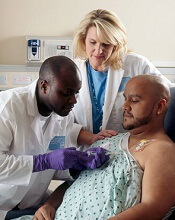User login
A new study suggests cancer patients may be more concerned with the human aspects of care than the technical ones.
Researchers studied complaints made by outpatients (or proxies) to a cancer institute over a 2-year period.
A majority of the complaints were management-related issues (48%), such as finance and billing problems, or relationship-related (41%), such as patient-staff dialogue.
Only 11% of the complaints were related to clinical issues, such as errors in diagnosis. However, these complaints were frequently of higher severity than others.
Jennifer W. Mack, MD, of Dana-Farber Cancer Institute in Boston, Massachusetts, and her colleagues reported these findings in The Joint Commission Journal on Quality and Patient Safety.
The researchers looked at complaints made to the Patient/Family Relations Office at the Dana-Farber Cancer Institute from January 2013 through December 2014.
There were 78,668 outpatients treated during this time, and 266 complaints were filed. Most complaints were filed by the patient (73%), 17% by the patient’s spouse/partner, 3% by a parent, 12% by another family member, 0.4% by a friend, 2% by the referring provider, and 1% by a social worker.
The complaints were placed in 3 categories—management, relationship, and clinical issues.
For 48% of the complaints, “management” was the primary category. This encompassed complaints related to:
- Service issues—15%
- Delays—13%
- Finance and billing—10%
- Access and admission—6%
- Bureaucracy—2%
- Environment—2%
- Referrals—0.4%.
For 41% of the complaints, “relationship” was the primary category, which encompassed:
- Communication breakdown—15%
- Respect, dignity, caring—15%
- Patient-staff dialogue—5%
- Staff attitudes—3%
- Confidentiality—2%
- Incorrect information—1%.
For 11% of the complaints, “clinical” was the primary category, which encompassed complaints related to:
- Quality of care—4%
- Skills and conduct—2%
- Patient journey—2%
- Treatment—1%
- Errors in diagnosis—1%
- Safety incidents—1%
- Examinations—0.4%.
Fifty-seven percent of clinical complaints were considered high severity, as were 28% of relationship complaints and 7% of management complaints
Overall, most (64%) complaints were classified as low severity, 16% were moderate, and 20% were high severity.
The following aspects raised the severity level of a complaint:
- Involvement of a prescribing oncologist—27%
- Strong affect of the complainant, including anger—15%
- Allegation of a medical error or suboptimal care—6%
- Request or desire to transfer care to another provider (12%) or institution (5%)
- Mention of malpractice or a desire to pursue legal action—1%.
The researchers said this study provides insight into patient and family values when it comes to cancer care, suggesting they prioritize high-quality relationships and communication. And a systematic review of complaints could reveal areas where care fails to meet patient and family needs. ![]()
A new study suggests cancer patients may be more concerned with the human aspects of care than the technical ones.
Researchers studied complaints made by outpatients (or proxies) to a cancer institute over a 2-year period.
A majority of the complaints were management-related issues (48%), such as finance and billing problems, or relationship-related (41%), such as patient-staff dialogue.
Only 11% of the complaints were related to clinical issues, such as errors in diagnosis. However, these complaints were frequently of higher severity than others.
Jennifer W. Mack, MD, of Dana-Farber Cancer Institute in Boston, Massachusetts, and her colleagues reported these findings in The Joint Commission Journal on Quality and Patient Safety.
The researchers looked at complaints made to the Patient/Family Relations Office at the Dana-Farber Cancer Institute from January 2013 through December 2014.
There were 78,668 outpatients treated during this time, and 266 complaints were filed. Most complaints were filed by the patient (73%), 17% by the patient’s spouse/partner, 3% by a parent, 12% by another family member, 0.4% by a friend, 2% by the referring provider, and 1% by a social worker.
The complaints were placed in 3 categories—management, relationship, and clinical issues.
For 48% of the complaints, “management” was the primary category. This encompassed complaints related to:
- Service issues—15%
- Delays—13%
- Finance and billing—10%
- Access and admission—6%
- Bureaucracy—2%
- Environment—2%
- Referrals—0.4%.
For 41% of the complaints, “relationship” was the primary category, which encompassed:
- Communication breakdown—15%
- Respect, dignity, caring—15%
- Patient-staff dialogue—5%
- Staff attitudes—3%
- Confidentiality—2%
- Incorrect information—1%.
For 11% of the complaints, “clinical” was the primary category, which encompassed complaints related to:
- Quality of care—4%
- Skills and conduct—2%
- Patient journey—2%
- Treatment—1%
- Errors in diagnosis—1%
- Safety incidents—1%
- Examinations—0.4%.
Fifty-seven percent of clinical complaints were considered high severity, as were 28% of relationship complaints and 7% of management complaints
Overall, most (64%) complaints were classified as low severity, 16% were moderate, and 20% were high severity.
The following aspects raised the severity level of a complaint:
- Involvement of a prescribing oncologist—27%
- Strong affect of the complainant, including anger—15%
- Allegation of a medical error or suboptimal care—6%
- Request or desire to transfer care to another provider (12%) or institution (5%)
- Mention of malpractice or a desire to pursue legal action—1%.
The researchers said this study provides insight into patient and family values when it comes to cancer care, suggesting they prioritize high-quality relationships and communication. And a systematic review of complaints could reveal areas where care fails to meet patient and family needs. ![]()
A new study suggests cancer patients may be more concerned with the human aspects of care than the technical ones.
Researchers studied complaints made by outpatients (or proxies) to a cancer institute over a 2-year period.
A majority of the complaints were management-related issues (48%), such as finance and billing problems, or relationship-related (41%), such as patient-staff dialogue.
Only 11% of the complaints were related to clinical issues, such as errors in diagnosis. However, these complaints were frequently of higher severity than others.
Jennifer W. Mack, MD, of Dana-Farber Cancer Institute in Boston, Massachusetts, and her colleagues reported these findings in The Joint Commission Journal on Quality and Patient Safety.
The researchers looked at complaints made to the Patient/Family Relations Office at the Dana-Farber Cancer Institute from January 2013 through December 2014.
There were 78,668 outpatients treated during this time, and 266 complaints were filed. Most complaints were filed by the patient (73%), 17% by the patient’s spouse/partner, 3% by a parent, 12% by another family member, 0.4% by a friend, 2% by the referring provider, and 1% by a social worker.
The complaints were placed in 3 categories—management, relationship, and clinical issues.
For 48% of the complaints, “management” was the primary category. This encompassed complaints related to:
- Service issues—15%
- Delays—13%
- Finance and billing—10%
- Access and admission—6%
- Bureaucracy—2%
- Environment—2%
- Referrals—0.4%.
For 41% of the complaints, “relationship” was the primary category, which encompassed:
- Communication breakdown—15%
- Respect, dignity, caring—15%
- Patient-staff dialogue—5%
- Staff attitudes—3%
- Confidentiality—2%
- Incorrect information—1%.
For 11% of the complaints, “clinical” was the primary category, which encompassed complaints related to:
- Quality of care—4%
- Skills and conduct—2%
- Patient journey—2%
- Treatment—1%
- Errors in diagnosis—1%
- Safety incidents—1%
- Examinations—0.4%.
Fifty-seven percent of clinical complaints were considered high severity, as were 28% of relationship complaints and 7% of management complaints
Overall, most (64%) complaints were classified as low severity, 16% were moderate, and 20% were high severity.
The following aspects raised the severity level of a complaint:
- Involvement of a prescribing oncologist—27%
- Strong affect of the complainant, including anger—15%
- Allegation of a medical error or suboptimal care—6%
- Request or desire to transfer care to another provider (12%) or institution (5%)
- Mention of malpractice or a desire to pursue legal action—1%.
The researchers said this study provides insight into patient and family values when it comes to cancer care, suggesting they prioritize high-quality relationships and communication. And a systematic review of complaints could reveal areas where care fails to meet patient and family needs. ![]()

